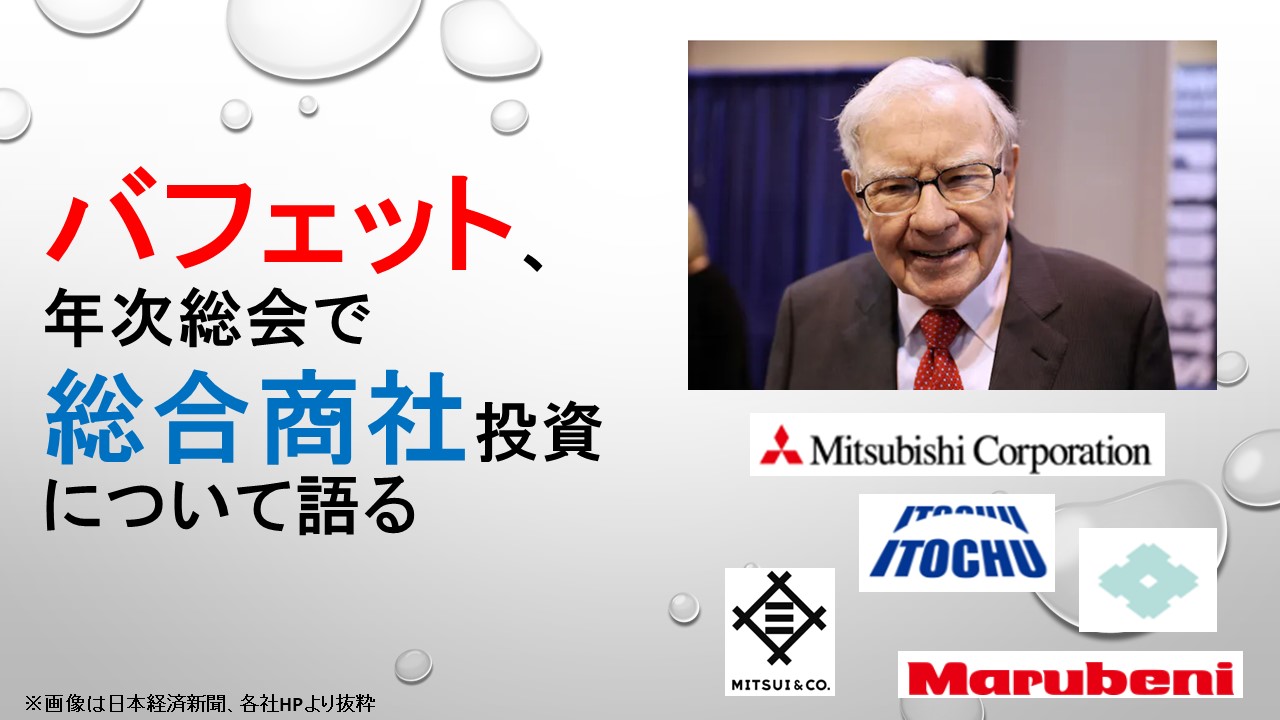5/6(土)、ウォーレン・バフェット率いるバークシャー・ハザウェイが年次総会を開きました。

(投資先の総合商社について)一緒に事業をするのを期待している。
日本での投資は完了していない。これからも日本企業の投資先を探していく。
と発言するなど、日本市場へのポジティブな影響が期待されます。
年次総会前の5/5(金)、CNBCニュースが掲載した総合商社株投資に関する記事が興味深かったので、その内容を紹介します。
バフェットがどのように総合商社投資について考えているのか、米国のニュース記事がどのように総合商社について伝えているのか、投資の参考にして頂けますと幸いです。
江戸・徳川時代の鎖国の話などもでてきて、そのルーツが面白かったです。
さて、米国の投資家たちはこの記事を読んでどんな投資判断を下すのでしょう。
原文に興味のある方は以下よりアクセス下さい。
What Warren Buffett is buying in Japan Berkshire Hathaway look-alikes (cnbc.com)
■記事の詳細(原文)
Japanese stocks have been on a tear since late last year, up nearly 15% since November, as the weak yen and inbound tourism help to reactivate the economy.
But Warren Buffett added a spark in April when he visited Japan to announce that Berkshire Hathaway boosted its investment in Japanese trading houses to 7.4%.
Overseas investors followed suit, buying $7.83 billion in Japanese stocks during five days of trading through April 14.
Buffett said the five — Itochu Corp., Marubeni Corp., Mitsubishi Corp., Mitsui, and Sumitomo Corp. — are comparable to Berkshire itself.
They have diversified portfolios with long-term investments and a focus on value and cash flow.
“I just thought these were big companies.
They were companies that I generally understood what they did.
Somewhat similar to Berkshire in that they owned lots of different interests,”
Buffett told CNBC’s Squawk Box during his April visit to Japan.
“And they were selling at what I thought was a ridiculous price, particularly the price compared to the interest rates prevailing at that time.”
But many observers and Berkshire investors may still have questions for Buffett about his bigger bet on Japan’s economy as they descend on Omaha, Nebraska, this weekend for the Berkshire Hathaway annual shareholders meeting.
For an investor who, in addition to looking for stocks trading a discount to intrinsic value, has always sought companies with durable economic “moats” in their industries and markets, what makes these Japanese firms so appealing?
Here are a few answers.
Samurai roots for Buffett’s Japanese stocks
The five trading firms that Berkshire has invested in are the biggest of Japan’s so-called sogo-shosha, or general trading companies.
Their traditional role has been to import energy, minerals and food into Japan, a mostly mountainous archipelago with few natural resources, and to export finished products.
The sogo-shosha occupy a special place in the country’s business world, partly as a result of Japan’s unusual history.
During the samurai period, the Tokugawa shogun dynasty closed Japan off from the rest of the world for over 200 years.
After it was opened to trade in the 19th century, its new leadership feared colonization by Western powers and embarked on a rapid program of modernization.
As industrialization began reshaping what had been an essentially feudal economy, the zaibatsu financial cliques centered on mercantile houses, some with roots going back to the 17th century, took on key trading roles and accumulated enormous influence on national policy.
The Empire of Japan quickly caught up to Western powers and engaged in protracted military conflicts.
Post-World War II reorg through 1990s recession
The zaibatsu were dissolved or reorganized under the Allied occupation of Japan following World War II and replaced by keiretsu, which are groups of companies with cross-shareholding relationships and centered on a bank.
They helped the country rebuild after wartime devastation, again accumulating massive wealth and clout.
The trading companies played a key role in the keiretsu system by leveraging their overseas connections to help Japanese manufacturers expand their business abroad.
But keiretsu began losing influence after the long Japanese recession that began in the early 1990s, while trading houses saw their own role diminish.
“They used to be the quarterback of their groupings (particularly for the zaibatsus, mainly linked with the main bank of the group), mainly helping Japanese firms expand their business abroad,” says Seijiro Takeshita, professor of management and informatics at the University of Shizuoka.
“However, such need has dropped significantly, as the manufacturers are now able to negotiate on their own.
Hence, the sogo-shoshas have diversified into various areas, particularly into energy and natural resources,” Takeshita said.
Business revenue beyond trading
Among Berkshire’s biggest investments are utility operations, rails, financials and insurance, and energy companies, but Buffett has bought everything from truck stops (Pilot Flying J) to fast-food chains (Dairy Queen), industrials and manufacturing companies (e.g., Lubrizol and Precision Castparts), and one of China’s leading EV developers, BYD.
Today, Japan’s trading companies derive most of their revenue from non-trade activities.
In shifting from import-export to business management, they have built up interests in everything from logistics and real estate to frozen foods and aerospace; newer investments include electric vehicles and renewable energy.
Their affiliated brands are fairly ubiquitous in Japan, but what they don’t have in common with some other notable Berkshire stock holdings is powerful global consumer products like Apple or Coca-Cola.
Still, their economic clout makes them underrated players.
The shosha and their affiliates represent a large industrial grouping of 5,900 companies and 460,000 workers in over 200 cities around the world, according to the Japan Foreign Trade Council (JFTC), a shosha industry group representing 40 companies and 20 associations.
These complex global operations make their business relatively difficult to understand for investors, but they’re also an advantage.
“By getting involved in mutually related businesses in a wide range of areas, from upstream to downstream, shosha gain a bird’s-eye view of the entire business process and provide convenience to customers by providing functions such as finance, information, and logistics where necessary,” said Ryosuke Kawai, general manager of the Research Group at JFTC.
“They are able to create new businesses with higher added value.”
“The point is not only that the scope of business is extensive and diverse, but trading companies also play a significant role in the global economy,” says Chika Fukumoto, a trading companies analyst with J.P. Morgan Japan.
But some recent tailwinds are fading. Amidst heightened worry around a global economic slowdown, the trading companies ability to maintain and improve capital efficiency won’t necessarily come from higher commodity prices and a weaker yen, and to enhance shareholder return, Fukumoto says, “enhancing the quality of their portfolios would be the key determinant for longer-term share price.”
■記事の詳細(日本語訳)
円安とインバウンド観光による経済の再活性化を背景に、日本株は昨年末から絶好調で、11月以降は15%近くも上昇しています。
しかし、4月にウォーレン・バフェット氏が来日し、バークシャー・ハサウェイが日本の商社への投資比率を7.4%に高めたことを発表し、さらに火がつきました。
海外投資家もこれに続き、14日までの5日間の取引で日本株を78億3000万ドル購入しました。
バフェット氏は、伊藤忠商事、丸紅、三菱商事、三井物産、住友商事の5社は、バークシャー社そのものに匹敵すると述べます。
長期的な投資を行い、価値とキャッシュフローを重視し、多様なポートフォリオを持っています。
「私は、これらの企業は大企業だと思いました。何をやっている会社なのか、大体理解できる会社でした。バークシャーに似ているのは、さまざまな利益を所有している点です。」
と、バフェット氏は4月の来日時にCNBCのSquawk Boxで語りました。
「特に当時の金利と比較すると、とんでもない値段で売られていました。」
しかし、多くのオブザーバーやバークシャーの投資家は、今週末、バークシャー・ハサウェイの年次株主総会でネブラスカ州オマハに集まるバフェット氏に、彼の日本経済への大きな賭けについてまだ質問しているかもしれません。
本源的価値より割安な銘柄を探すだけでなく、常にその業界や市場において耐久性のある経済的「堀」を持つ企業を求めてきた投資家にとって、日本企業の魅力は何なのか。
その答えがここにあります。
バフェットの日本株にサムライのルーツがある
バークシャーが投資した5つの商社は、日本の総合商社と呼ばれる会社の中でも最大手です。
エネルギー、鉱物、食料を輸入し、完成品を輸出するというのが、総合商社の伝統的な役割です。
総合商社が日本のビジネス界で特別な位置を占めるようになったのは、日本の特異な歴史が一因としてあります。
武士の時代、徳川将軍家は200年以上もの間、日本を鎖国していました。
19世紀に開国した日本は、欧米列強の植民地化を恐れ、急速な近代化に乗り出しました。
工業化によって封建的な経済が変化すると、17世紀から続く商社を中心とした財閥が貿易の中心的役割を担い、国の政策に大きな影響力を持つようになりました。
大日本帝国は、欧米列強に追いつき、長期の軍事衝突を繰り返しました。
第二次世界大戦後の再編成から1990年代の不況まで
財閥は、第二次世界大戦後の連合国軍の占領下で解散または再編され、代わりに銀行を中心とした株式持ち合い型の企業グループである系列会社が誕生しました。
商社は、戦時中の荒廃した日本の復興に貢献し、再び巨額の富と影響力を蓄えました。
商社は、海外とのコネクションを活かして、日本の製造業の海外進出を支援するなど、系列システムの重要な役割を担いました。
しかし、1990年代前半に始まった日本の長期不況により、系列は影響力を失い始め、商社は自らの役割を縮小していきました。
静岡県立大学の竹下誠二郎教授(経営情報学)は、「かつてはグループの四分の一の存在で(特に財閥系はグループのメインバンクとの連携が中心)、主に日本企業の海外進出を支援していました」と語る。
「しかし、メーカーが自前で交渉できるようになったため、そうしたニーズは大きく低下しました。
それゆえ、総合商社はさまざまな分野、特にエネルギーや天然資源に手を広げてきたのです」と竹下は言います。
トレーディング以外の事業収益
バークシャーの最大の投資先は、公益事業、鉄道、金融・保険、エネルギー会社などだが、バフェットはトラックストップ(パイロット・フライングJ)からファストフードチェーン(デイリークイーン)、工業・製造業(ルーブリゾール、プレシジョン・キャストパーツなど)、中国有数のEV開発企業であるBYDまで、あらゆる企業を買っています。
現在、日本の商社は収益の大半を非貿易活動から得ています。
輸出入から事業経営に移行する中で、物流、不動産、冷凍食品、航空宇宙など、あらゆる分野で事業を展開し、最近では電気自動車や再生可能エネルギーへの投資も行っています。
しかし、アップルやコカ・コーラのような世界的な消費財は、バークシャーが保有する他の銘柄と共通していません。
しかし、その経済的な影響力は、過小評価される要因となっています。
40社20団体からなる商社の業界団体である日本貿易会(JFTC)によれば、商社とその関連会社は、世界200都市以上で5,900社、46万人の労働者を抱える大規模な産業グループです。
こうした複雑なグローバル展開は、投資家にとって彼らのビジネスを比較的理解しにくいものにしているが、それは同時にメリットでもあります。
「川上から川下まで幅広い領域で相互に関連する事業に関わることで、商社は事業プロセス全体を俯瞰し、必要に応じて金融、情報、物流などの機能を提供することで、顧客の利便性を高めることができます。」
と、日本貿易会の研究グループ長である河合良介氏は語ります。
「より付加価値の高い新ビジネスを創出することができます。」 J.P.モルガン・ジャパンの商社アナリスト、Fukumoto Chika氏は「ポイントは、事業範囲が広く多様であるだけでなく、商社が世界経済において重要な役割を担っていることです」
と話す。
しかし、最近の追い風は薄れつつあります。
世界経済の減速懸念が高まる中、商社が資本効率を維持・向上させる能力は、必ずしも商品価格の上昇や円安から得られるとは限らず、株主還元を高めるためには、「ポートフォリオの質を高めることが、長期的な株価の重要な決定要因になるだろう」と福本は言います。



コメント